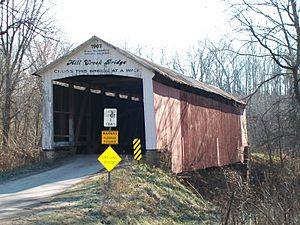Mill Creek Covered Bridge facts for kids
Quick facts for kids Mill Creek Covered Bridge |
|
|---|---|
 |
|
| Coordinates | 39°54′30.79″N 87°21′39.15″W / 39.9085528°N 87.3608750°W |
| Carries | Towpath Road |
| Crosses | Mill Creek, Indiana |
| Locale | Parke, Indiana, United States |
| Official name | Mill Creek Covered Bridge |
| Other name(s) | Thompson’s Ford, Tow Path Bridge, and Earl Ray Bridge |
| Named for | Mill Creek |
| Maintained by | Parke County |
| NBI Number | 6100152 |
| Characteristics | |
| Design | National Register of Historic Places |
| Total length | 112 ft (34 m)92ft +10ft overhangs on each end |
| Width | 15 ft (4.6 m) |
| Height | 15 ft (4.6 m) |
| History | |
| Constructed by | Hendricks, William; D.M. Brown, Contractor |
| MPS | Parke County Covered Bridges TR |
| NRHP reference No. | 78000403 |
| Added to NRHP | Dec 22, 1978 |
| Lua error in Module:Location_map at line 420: attempt to index field 'wikibase' (a nil value). | |
The Mill Creek Covered Bridge is a cool old bridge in Parke County, Indiana. It's also known by other names like "Thompson's Ford Covered Bridge" or "Tow Path Covered Bridge." This special bridge crosses Mill Creek, a stream near Tangier, Indiana. It was built way back in 1907 by a builder named D. M. Brown. This bridge is a type called a Burr Arch Truss, which means it has a unique design with arches and beams. Because it's so old and important, it was added to the National Register of Historic Places in 1978.
Contents
Bridge History and Names
The Mill Creek Covered Bridge has a long and interesting history. It crosses a stream called Mill Creek. The land nearby used to belong to someone named Thornton Thompson.
Why So Many Names?
- Thompson's Ford: This name likely comes from Joseph Thompson. He built a small mill near the creek way back in 1829. A "ford" is a shallow place where you can cross a river.
- Earl Ray Bridge: Some people think this name comes from a well-known person who lived nearby. He was famous for being an auctioneer.
- Tow Path Bridge: This name comes from the road the bridge is on, called Tow Path Road. This road used to be a "towpath" for the Wabash and Erie Canal.
The Wabash and Erie Canal Connection
The Wabash and Erie Canal was a very long canal that helped boats move goods. It crossed Mill Creek just south of where the bridge is now. A towpath was a path next to the canal. Mules or horses would walk on the towpath and pull boats along the canal.
Even though the canal wasn't used anymore when the bridge was built, there was an aqueduct nearby. An aqueduct is like a bridge that carries water. This old aqueduct was sometimes used as a bridge after the canal was drained.
Building the Bridge
Building a bridge like this was a big job! A builder named D. M. Brown was chosen for the project. He started building the bridge in 1907. However, Mr. Brown faced some challenges getting the work going. He decided to hire William Hendricks, who had more experience building bridges. Mr. Hendricks helped with the actual construction of the bridge.
Gallery


